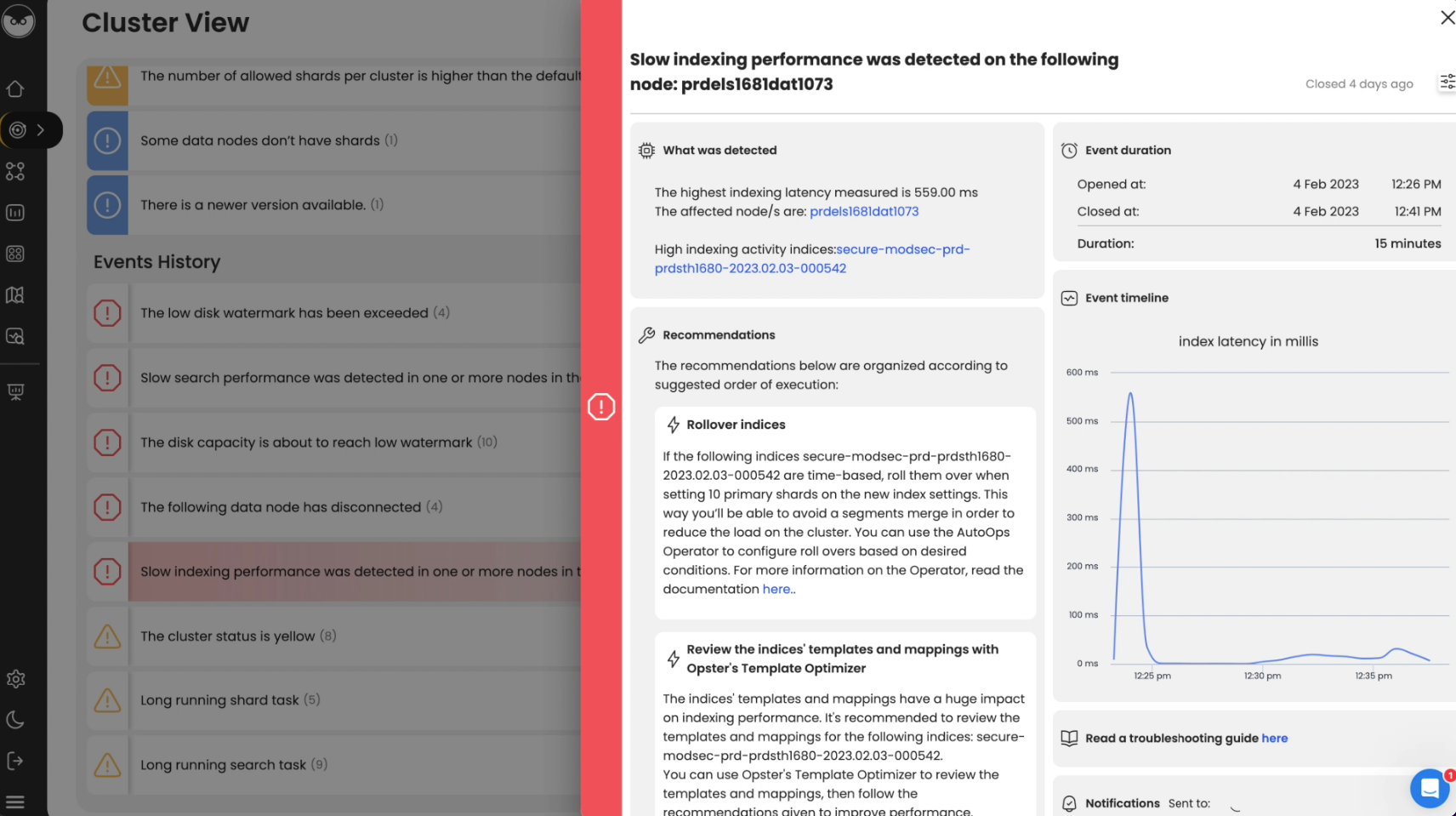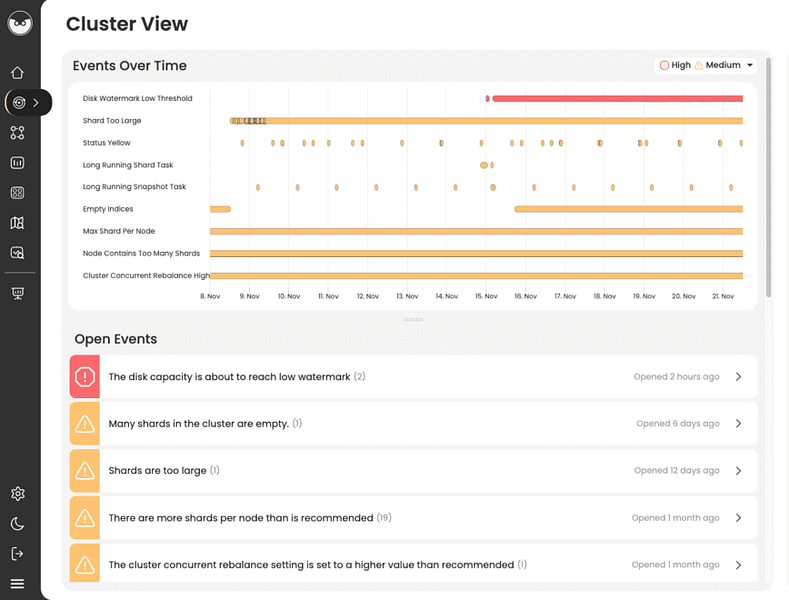Opster Team
Before you begin reading this guide, we recommend you try running the Elasticsearch Error Check-Up which analyzes 2 JSON files to detect many configuration errors.
Briefly, this error indicates that a parameter used in the Elasticsearch query must be of type string, but a different data type was used. Elasticsearch supports various data types like text, numeric, and date, and using an incorrect data type can cause the query to fail. To resolve this error, review the Elasticsearch query and ensure that the parameter is of type string.
To easily locate the root cause and resolve this issue try AutoOps for Elasticsearch & OpenSearch. It diagnoses problems by analyzing hundreds of metrics collected by a lightweight agent and offers guidance for resolving them.
Take a self-guided product tour to see for yourself (no registration required).
This guide will help you check for common problems that cause the log ” Value must be of type String: ” + parameterName + ” ” to appear. To understand the issues related to this log, read the explanation below about the following Elasticsearch concepts: reindex and index.
Overview
Reindex is the concept of copying existing data from a source index to a destination index which can be inside the same or a different cluster. Elasticsearch has a dedicated endpoint _reindex for this purpose. A reindexing is mostly required for updating mapping or settings.
Examples
Reindex data from a source index to destination index in the same cluster
POST /_reindex?pretty
{
"source": {
"index": "news"
},
"dest": {
"index": "news_v2"
}
}
Notes
- Reindex API does not copy settings and mappings from the source index to the destination index. You need to create the destination index with the desired settings and mappings before you begin the reindexing process.
- The API exposes an extensive list of configuration options to fetch data from the source index, such as query-based indexing and selecting multiple indices as the source index.
- In some scenarios reindex API is not useful, where reindexing requires complex data processing and data modification based on application logic. In this case, you can write your custom script using Elasticsearch scroll API to fetch the data from source index and bulk API to index data into destination index.

Index and indexing in Elasticsearch - 3 min
Overview
In Elasticsearch, an index (plural: indices) contains a schema and can have one or more shards and replicas. An Elasticsearch index is divided into shards and each shard is an instance of a Lucene index.
Indices are used to store the documents in dedicated data structures corresponding to the data type of fields. For example, text fields are stored inside an inverted index whereas numeric and geo fields are stored inside BKD trees.
Examples
Create index
The following example is based on Elasticsearch version 5.x onwards. An index with two shards, each having one replica will be created with the name test_index1
PUT /test_index1?pretty
{
"settings" : {
"number_of_shards" : 2,
"number_of_replicas" : 1
},
"mappings" : {
"properties" : {
"tags" : { "type" : "keyword" },
"updated_at" : { "type" : "date" }
}
}
}List indices
All the index names and their basic information can be retrieved using the following command:
GET _cat/indices?v
Index a document
Let’s add a document in the index with the command below:
PUT test_index1/_doc/1
{
"tags": [
"opster",
"elasticsearch"
],
"date": "01-01-2020"
}Query an index
GET test_index1/_search
{
"query": {
"match_all": {}
}
}Query multiple indices
It is possible to search multiple indices with a single request. If it is a raw HTTP request, index names should be sent in comma-separated format, as shown in the example below, and in the case of a query via a programming language client such as python or Java, index names are to be sent in a list format.
GET test_index1,test_index2/_search
Delete indices
DELETE test_index1
Common problems
- It is good practice to define the settings and mapping of an Index wherever possible because if this is not done, Elasticsearch tries to automatically guess the data type of fields at the time of indexing. This automatic process may have disadvantages, such as mapping conflicts, duplicate data and incorrect data types being set in the index. If the fields are not known in advance, it’s better to use dynamic index templates.
- Elasticsearch supports wildcard patterns in Index names, which sometimes aids with querying multiple indices, but can also be very destructive too. For example, It is possible to delete all the indices in a single command using the following commands:
DELETE /*
To disable this, you can add the following lines in the elasticsearch.yml:
action.destructive_requires_name: true
Log Context
Log “Value must be of type String: [” + parameterName + “]”classname is RestUpdateByQueryAction.java We extracted the following from Elasticsearch source code for those seeking an in-depth context :
Object parameterValue = entry.getValue();
if (Script.LANG_PARSE_FIELD.match(parameterName; LoggingDeprecationHandler.INSTANCE)) {
if (parameterValue instanceof String || parameterValue == null) {
lang = (String) parameterValue;
} else {
throw new ElasticsearchParseException("Value must be of type String: [" + parameterName + "]");
}
} else if (Script.PARAMS_PARSE_FIELD.match(parameterName; LoggingDeprecationHandler.INSTANCE)) {
if (parameterValue instanceof Map || parameterValue == null) {
params = (Map) parameterValue;
} else {
Find & fix Elasticsearch problems
Opster AutoOps diagnoses & fixes issues in Elasticsearch based on analyzing hundreds of metrics.
Fix Your Cluster IssuesConnect in under 2 minutes

Billy McCarthy
Senior SysAdmin at Backblaze





